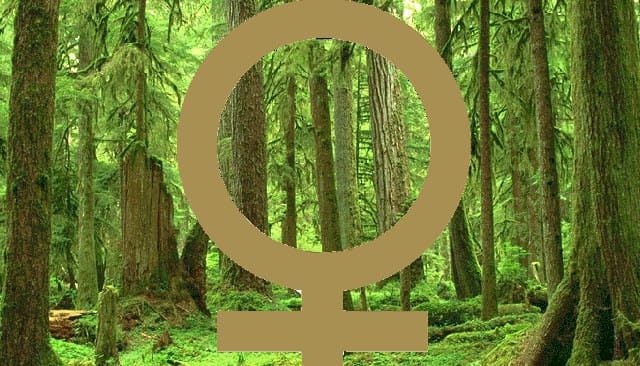Ecofeminism, also called ecological feminism, is a branch of feminism that examines the connections between women and nature. French feminist Françoise d’Eaubonne coined its name in 1974. Ecofeminism is also an ideology that sees climate change, gender equality, and social injustice more broadly as intrinsically related issues, all tied to patriarchy and capitalism. Some ecofeminists see women as being more in tune with nature because there is the attribute of fertility, nurturing, and being prone to exploitation. Ecofeminism has evolved over the years to capture the rights of marginalised people – indigenous women and girls & women and girls of colour.
African ecofeminism means women being at the forefront of environmental advocacy, agricultural awareness and sustainable living on the African continent. Women are nature’s guardians, they are the most vulnerable and the most affected by climate-induced food shortages. Reports have shown that women have indigenously improved knowledge in animal husbandry and crop breeding to maintain imperishable, less extractive lifestyles. African Arguments article dubbed ecofeminism as a movement affecting all marginalised people, not just women, standing up to corporations and governments against the exploitative use of land and natural resources, which has led to biodiversity loss, drought and loss of livelihoods.
Brazil’s Alessandra Munduruku, a leader of the Munduruku Indigenous people has fought tirelessly against activities of illegal mining and loggers in the Amazon. She, like other pioneer ecofeminists, has had to endure death threats, the risk to her family and imprisonment for a course dear to her heart.
Mariama Sonko is the national coordinator of Nous Sommes La Solution (We Are The Solution), Senegal’s rural women’s movement for food independence and environmental resource preservation that has successfully spread to other West African countries like Guinea, Ghana, Mali and Burkina Faso. This movement focuses on women’s empowerment, which hasn’t come without its share of struggles and misogynist opposition.
Ecological sustainability activists have over the years led campaigns in schools, communities, and countries pushing for change and paving the way for the younger generation of Africans, especially girls, to follow. A forerunner in her time, Kenya’s Nobel Peace Prize winner, Wangari Maathai made clear the interwoven nature of African ecofeminism and African environmental activism, empowering women in her rural community.
India’s Chipko Movement (tree hugging) started in 1973, which sought to prevent the disenfranchisement of its native dwellers from powerful logging corporations that lobbied to invade their villages and exploit their land for financial gains leaving them with nothing but degradation. This movement harnessed the vision and will of like-minded villagers to stage standoffs and non-violent protests against political authorities and interest parties.
The importance of incorporating activism, and I dare say African environmental activism, into primary and secondary school curricula, is now more important than ever before based on the impact of climate change, with human’s increasingly extractive activities on nature being its causative factor. Ecofeminism can be said to be an ideology of respect for nature and its female guardian, which young girls should inculcate. Studies have shown that increased gender-based violence stems from more child marriages in Africa’s Sahel region. These occurrences originate from the need of poor families to survive famine and drought, hence, female children either drop out of school or are given off in marriage to wealthy families in exchange for money or a parcel of land.
Ecofeminism calls attention to the fact that women are disproportionately affected by environmental issues. According to a United Nations report, because women worldwide typically hold less monetary wealth and rely on the natural environment the most, they are more likely to be displaced by climate change and have to travel farther for resources, like water, as dry seasons become a lot more frequent.
Ecofeminism in itself is a laudable movement but hasn’t been without its pushbacks and criticisms. Some schools of thought consider ecofeminism to be a white female affair, and not for all races.
Some ecofeminist principles that should be adopted are:
- Oppression of marginalised people and unsustainable destruction of natural resources are both fueled by greed and a quest for power.
- The group of persons most affected by environmental degradation should be the champions of climate action movements.
- As a people, we should move away from the quest for dominance to an ethic of care.
- All forms of oppression are unacceptable, albeit connected.
- The understanding is that these ecofeminist connections are integral for tangible change.
Ecofeminism highlights the importance of all nations, especially polluting countries, to implement the 2015 Paris Agreement to reduce the global temperature rise of 1.50C and limit greenhouse gas emissions to a 43% decline by 2030. It equally lays bare the unwillingness of some corporations to pay communities affected by the impact of their industrialization activities.
It is worth noting that the effects of climate change have brought with it opportunities for women and girls’ empowerment in the STEM sector, under low-carbon solutions and carbon-neutrality projects. Without a doubt, adopting ecofeminist ideals in managing natural resources in the continent will in the long term increase man’s chances of having the planet available and habitable now, and for future generations.
Author: Anita Ike

